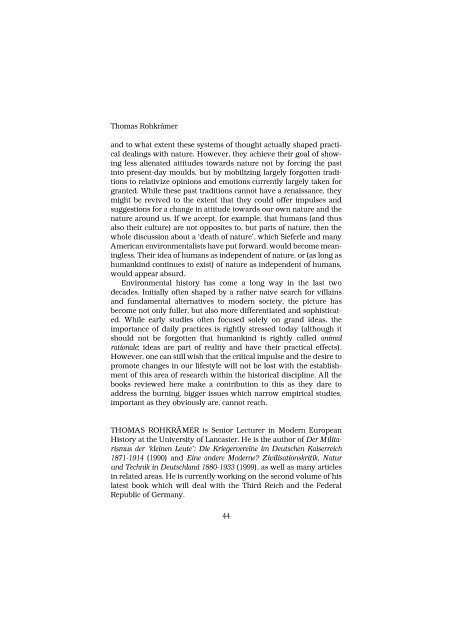Download - German Historical Institute London
Download - German Historical Institute London
Download - German Historical Institute London
You also want an ePaper? Increase the reach of your titles
YUMPU automatically turns print PDFs into web optimized ePapers that Google loves.
Thomas Rohkrämer<br />
and to what extent these systems of thought actually shaped practical<br />
dealings with nature. However, they achieve their goal of showing<br />
less alienated attitudes towards nature not by forcing the past<br />
into present-day moulds, but by mobilizing largely forgotten traditions<br />
to relativize opinions and emotions currently largely taken for<br />
granted. While these past traditions cannot have a renaissance, they<br />
might be revived to the extent that they could offer impulses and<br />
suggestions for a change in attitude towards our own nature and the<br />
nature around us. If we accept, for example, that humans (and thus<br />
also their culture) are not opposites to, but parts of nature, then the<br />
whole discussion about a ‘death of nature’, which Sieferle and many<br />
American environmentalists have put forward, would become meaningless.<br />
Their idea of humans as independent of nature, or (as long as<br />
humankind continues to exist) of nature as independent of humans,<br />
would appear absurd.<br />
Environmental history has come a long way in the last two<br />
decades. Initially often shaped by a rather naive search for villains<br />
and fundamental alternatives to modern society, the picture has<br />
become not only fuller, but also more differentiated and sophisticated.<br />
While early studies often focused solely on grand ideas, the<br />
importance of daily practices is rightly stressed today (although it<br />
should not be forgotten that humankind is rightly called animal<br />
rationale; ideas are part of reality and have their practical effects).<br />
However, one can still wish that the critical impulse and the desire to<br />
promote changes in our lifestyle will not be lost with the establishment<br />
of this area of research within the historical discipline. All the<br />
books reviewed here make a contribution to this as they dare to<br />
address the burning, bigger issues which narrow empirical studies,<br />
important as they obviously are, cannot reach.<br />
THOMAS ROHKRÄMER is Senior Lecturer in Modern European<br />
History at the University of Lancaster. He is the author of Der Militarismus<br />
der ‘kleinen Leute’: Die Kriegervereine im Deutschen Kaiserreich<br />
1871-1914 (1990) and Eine andere Moderne? Zivilisationskritik, Natur<br />
und Technik in Deutschland 1880-1933 (1999), as well as many articles<br />
in related areas. He is currently working on the second volume of his<br />
latest book which will deal with the Third Reich and the Federal<br />
Republic of <strong>German</strong>y.<br />
44













